PROGRAM
COMPETITIONS
|
5th annual GDMC AI Settlement Generation Competition in Minecraft The GDMC competition is about writing an algorithm that can produce an "interesting" settlement for a previously unseen Minecraft map. · General Website:https://gendesignmc.engineering.nyu.e-du/ · Wiki:https://gendesignmc.wikidot.com/start · Discord:https://discord.gg/ueaxuXj · Twitter:@gendesignMC Contacts Christoph Salge, University of Hertfordshire, UKMichael Cerny Green, NYU, USRodrigo Canaan, Cal Poly State University, USChristian Guckelsberger, Aalto University, Finland & QMUL, UKJean-Baptiste Hervé, University of Hertfordshire, UK Julian Togelius, NYU, US 
|
The 4th International AI Werewolf Contest 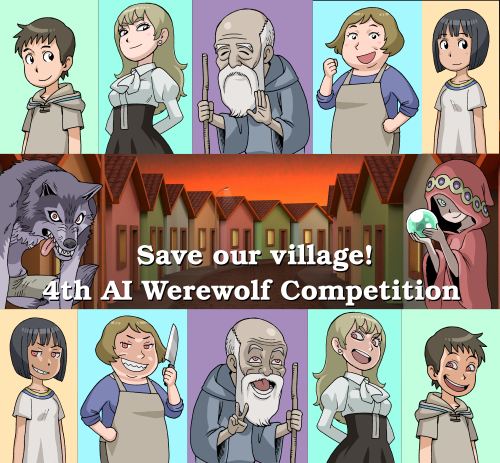
The goal of this competition is to develop AI agents that can play the Werewolf game (AKA Mafia) reliably well against other AI agents. Werewolf is a traditional Social Deduction game. In this competition, the players are divided in two teams: A Werewolf team (minority, know each other’ s roles), and a Human team (majority, do not know the roles of other players). A few players in each team have special actions in the game. The game progresses in days, where all players may discuss among themselves, then vote on one player to be eliminated. After the vote, the Werewolf team chooses another player to be eliminated. The goal of each team is to eliminate the opposing team. Because of its social and communication component, Werewolf is a challenging game for which no AI that can play at a strong level has been found yet. An effective Werewolf agent must be capable of: communication, deception, knowledge modeling, and strategy. The competition provides a Java game server, and sample client code in Java, C# and Python are provided. Organisers names and affiliations Claus Aranha (University of Tsukuba) Hirotaka Osawa (University of Tsukuba) Takashi Otsuki (Yamagata University) Fujio Toriumi (University of Tokyo) Yoshinobu Kano (Shizuoka University) Website link: https://aiwolf.org/en/4th-international-aiwolf-contest (Tips:If you want to open the web link, you must turn https into http.) Tracks (1)Protocol Division: The agents communicate using a well-defined communication protocol. (2)NLP Division: The agents communicate freely using English (or Japanese). (3)Platform Division: Submit useful tools for the AIWolf community! Contacts E-mail:gm@aiwolf.org Slack:https://join.slack.com/t/aiwolfen/share-d_invite/zt7fhm49w0nKBFpFDP4Kn5ak-71gSEpGw Twitter:https://twitter.com/aiwolf_org/ Submission deadline (1)Protocol Division: - Entry deadline (Agent registration): July 8th (Fri)- Finalist deadline (Agent Update, Code/Doc submission): August 5th (Fri) (2)NLP Division: - Registration (Submission of Self-Play logs): July 31 (Sun) AoE (Fri)- Online Challenge: August 8-11 (Please see regulation) (3)Platform Division: - August 10th Other information Keywords: social deduction game, negotiation, knowledge models, role prediction, communication, coalition forming, natural language processing, chatbots Programming languages: Python, Java, C# + Any Complexity: Medium-High Competitive: High (>50) Barrier of entry: Low   
|
|
The Dota 2 5v5 AI Competition The Dota 2 5v5 framework lets you develop, deploy, and run your own python program that controls the 5 heroes in the Radiant or Dire team, or both! The updated framework has baseline bots at your disposal for both, Radiant and Dire. Develop a bot for your preferred team, and use a built-in bot to test it! Or maybe you want to build bots for both teams and become your own worst enemy! The Dota 2 5v5 AI Competition challenges participants to code a bot that beats the opponent team (destroys the opponent’s Ancient) in the shortest time possible! - Your bot can play either as Radiant or Dire (your choice!).- You can freely choose 5 among all the available heroes for your team.- Your bot will face other bots in a standard Dota 2 5v5 match.- The winner will be the fastest bot at destroying the opponent’s Ancient. The framework saves the time elapsed from the match start to the Ancient’s destruction event, which will determine the competition winner. Organisers names and affiliations José Font and Alberto Álvarez (Department of Computer Science and Media Technology, Malmö University) Website link https://games.mau.se/research/the-dota2-5v5-ai-competition/ Video Contact E-mail: jose.font@mau.se E-mail:alberto.alvarez@mau.se Submission deadline July 10, 2022 Other information Keywords: Multi-agent AI, Cooperative AI, Real-time decision making, MOBA Programming languages: Python Complexity: Medium Competitive: Low (<10) Barrier of entry: Low 
|
Bot Bowl IV 
Bot Bowl is an AI competition using the Bot Bowl framework (previously known as FFAI). The Bot Bowl framework simulates the board game Blood Bowl by Games Workshop and offers APIs for scripted bots, search-based, and ML algorithms in Python. It's also possible to use another programming language while there are no existing APIs for that. Blood Bowl is a major challenge for artificial agents due to its complexity and lack of rewards. This also means that we don't have any basic baseline agents that are able to score points in this game! We do, however, provide tutorials on how to develop scripted, search-based, or ML bots. The competition will have one track using the traditional board size of 26x15 squares with 11 players on each side. We will like last year, restrict the game to only feature a prefixed Human roster (i.e. no Orcs, Elves, etc.). Last year, the winner of Bot Bowl III was surprisingly a machine learning bot showing great progress compared to previous years. We played the bot against a top-tier human player and had it streamed on Twitch. While the bot was competitive, it was clear that it was not yet on par with humans yet. We have arranged a new match next fall with the winner of Bot Bowl IV. This year we have improved the framework so the API now supports faster pathfinding and tree search. In the future, the competition can be extended to allow multiple races from the rulebook (orcs, elves, etc.), custom-made rosters, and board layouts (such as procedurally generated dungeons). 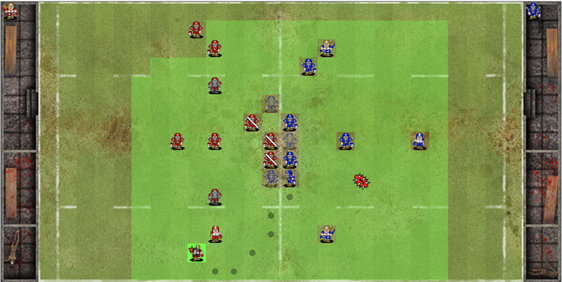
Organisers names and affiliations Niels Justesen (Ph.D., Modl.ai) Sebastian Risi (Professor, IT University of Copenhagen / Modl.ai) Julian Togelius (Associate Professor, New York University / Modl.ai) Website link https://bot-bowl.com (Tips:If you want to open the web link, you must turn https into http.) Contact Discord:https://discord.gg/MTXMuae Submission deadline July 15th Other information Keywords: Board games, Turn-based Strategy, Machine Learning, Planning, Search, Reinforcement Learning Programming languages: Python + Any Complexity: High Competitive: Low (<10) Barrier of entry: Medium 
|
|
DareFightingICE Competition Are there any sound designs in video games that consider visually impaired players when creating the said sound design? Our new FightingICE with enhanced sound called “DareFightingICE”is a platform for creating a sound design for them. There are two tracks. The first track is an AI competition, and the second track is a sound design competition. Submissions -- of an AI capable of operating with only sound input information or/and a sound design for visually impaired players -- are welcome. One of the three FightingICE characters, ZEN, will be used in 2022. The AI track utilizes the current sound design of DareFightingICE. There are two leagues: Standard and Speedrunning. Standard League considers the winner of a round as the one with the hit point (HP) above zero at the time its opponent's HP has reached zero. In Speedrunning League, the league winner is the AI with the shortest average time to beat our sample MCTS AI that has access to delayed game states and a sample deep-learning AI whose input is only audio data. This track's winner is decided considering both leagues' results based on the 2018 Formula-1 scoring system. In the sound design track, the winning sound design is the one that has not only the highest sum of the scores from blindfolded human test players (scores here include both relative game scores compared when playing without being blindfolded and subjective scores assessing sound aesthetic) but also the highest learning curve plus other metrics when played by the aforementioned sample deep-learning AI. The winning AI and the winning sound design this year will be used in evaluation of entries to the sound design track and the AI track, respectively, in the subsequent competition next year. 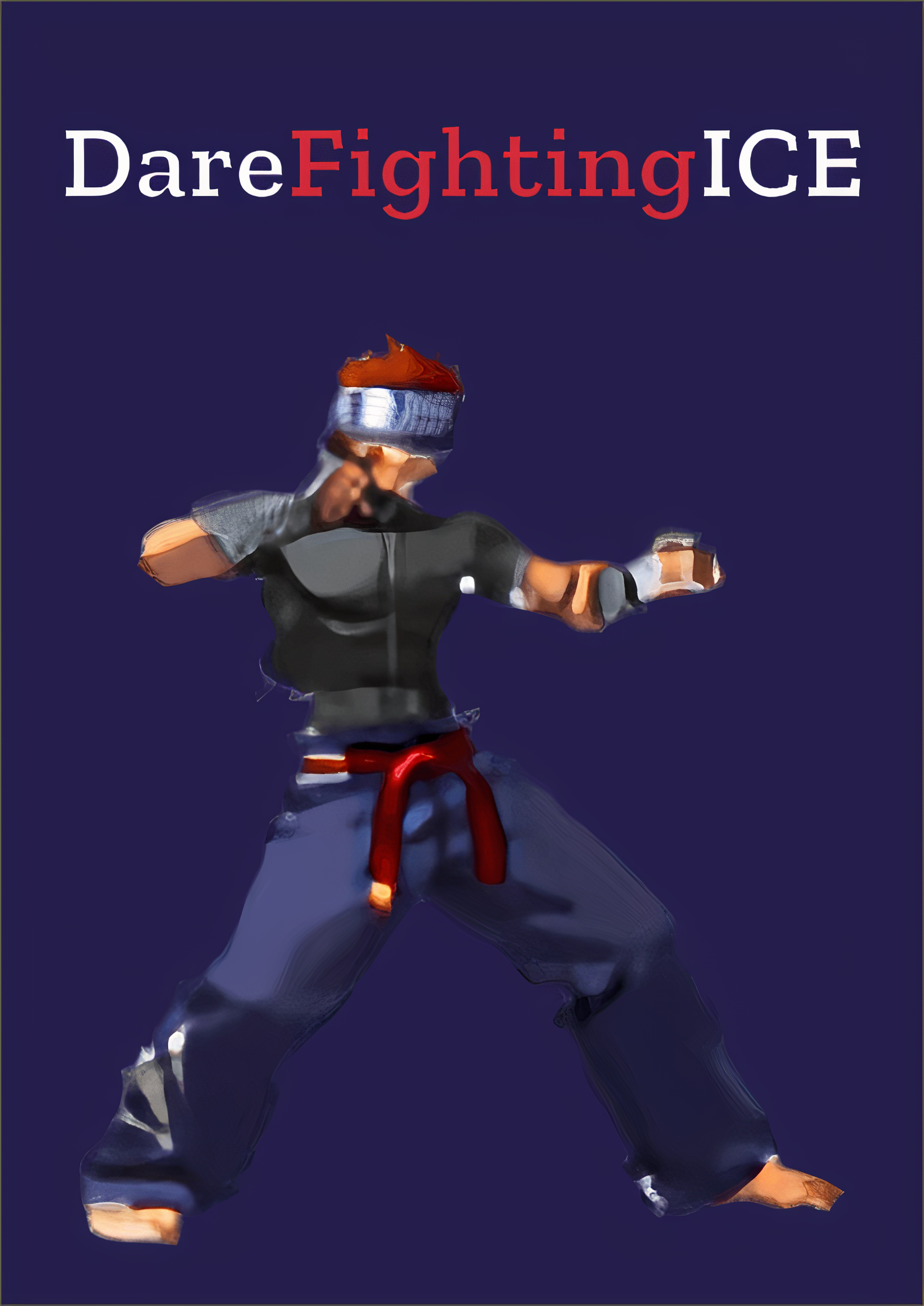
Organisers names and affiliations Xincheng Dai, Ibrahim Khan, Van Thai Nguyen, Ruck Thawonmas (Ritsumeikan University) Tracks (1)AI Track: This track seeks submissions for the strongest blind fighting-game AI. (2)Sound Design Track: This track seeks submissions for the best fighting-game sound design. Website link https://tinyurl.com/DareFightingICE Video Contact Email: ftg.aic@gmail.com Submission deadline Midterm deadline: May 24, 2022 (23:59 JST) Final deadline: July 29, 2022 (23:59 JST)(no extension!!) Other information Keywords: deep learning, recurrent networks, reinforcement learning, audio, sound; sound design, visually impaired, accessibility, sound aesthetic, fighting games Programming languages: Python, Java + Any Complexity: Medium-High Competitive: New Competition Barrier of entry: Medium  
|
Pandemic: Tabletop Games Competition The Tabletop Games framework (TAG) https://github.com/GAIGResearch/TabletopGames provides various modern tabletop games that are suitable for AI research. TAG is implemented in Java and it provides a fast forward model for all 15 games currently included, with a few AI agents such as MCTS and RHEA able to play all games as well. One of the games in the framework is Pandemic: a collaborative 2-4 player game where players have to work together in order to eradicate 4 types of diseases. Pandemic features partial-observability, reactive turn orders, asymmetric roles and long term planning. It is one of the most challenging games in the TAG framework and none of the baseline agents can solve the full game without carefully crafted domain knowledge. The competition proposed focuses on the game Pandemic in particular: the objective for participants will be to submit agents that perform well on various configurations of a 4-player Pandemic game. The configurations are going to feature easier versions of the game with less diseases, and less epidemic cards to lower the entry barrier. The best entry is going to be determined by the overall win rate on a hidden set of game configurations. 
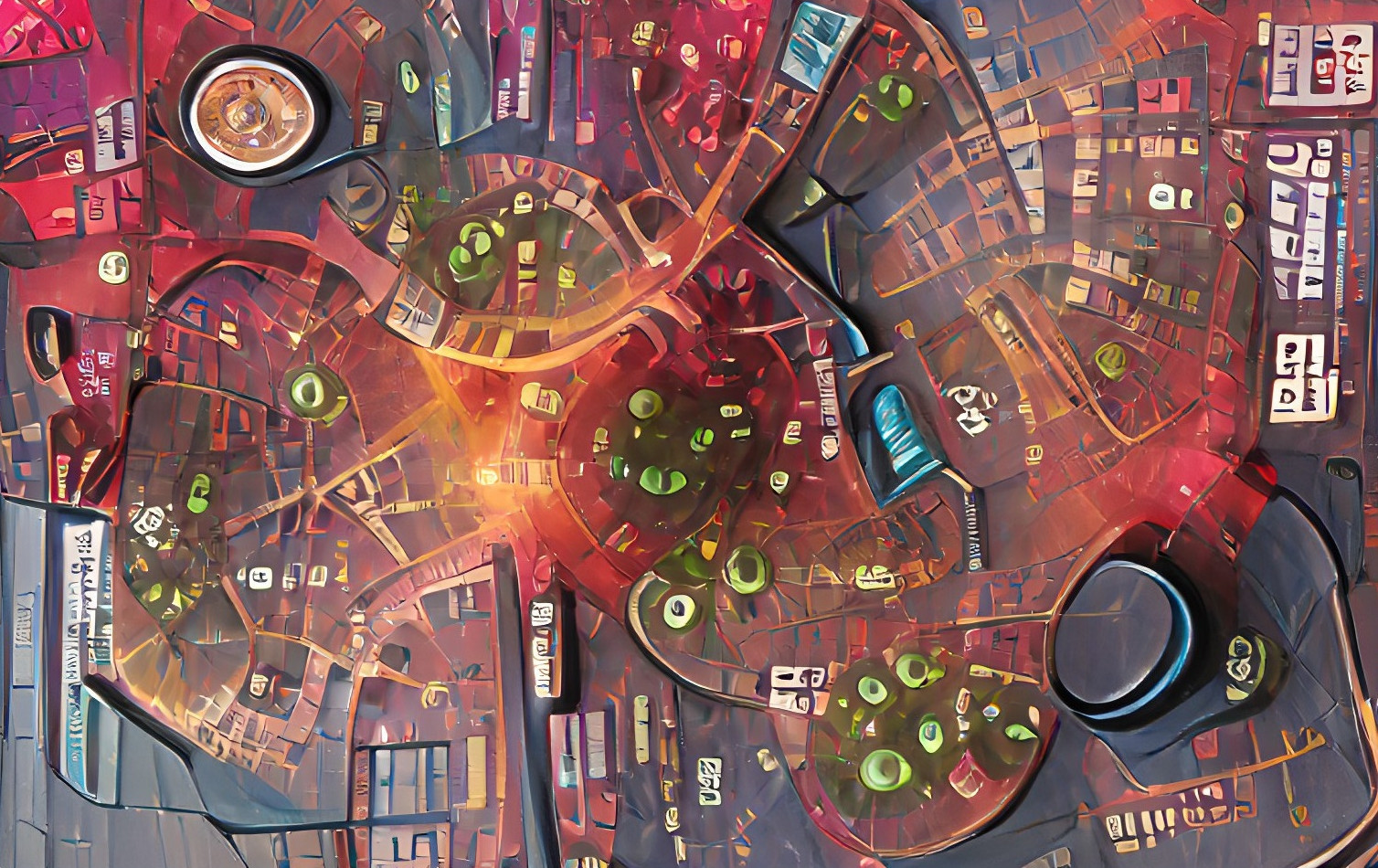
Organisers names and affiliations Martin Balla, Raluca Gaina (Queen Mary University of London, UK) Raul Montoliu (Jaume I University, Spain) Website link https://www.tabletopgames.ai/competition/cog20-22 Contact Email: tagframework@gmail.com Submission deadline 3rd June (trial) 29th July (final) Other information Keywords: collaboration, planning/search, board games, forward model, strategy games Programming languages: Java, Kotlin Complexity: Medium Competitive: New Competition Barrier of entry: Low 
|
|
AI Snakes Game 2022 Our competition focuses on reestablishing Snakes, one of the most iconic cross-platform games, in a new light. The participants will once again delve into the familiar world of eating apples and avoiding their own tails, but this time they will also square off against each other in an intense battle of wits. Enrol and lead your slithering creation to glory in AI Snakes 2022! Organisers names and affiliations Luiz Jonatã Pires de Araújo, PhD (University of Lincoln) Joseph Alexander Brown, PhD, Alexandr Grichshenko (Innopolis University) Website link https://sites.google.com/view/ai-snakes-game Contact Luiz Araujo:ljonata@gmail.com Submission deadline TBA Other information Keywords: artificial intelligence; arcade games; snakes Programming languages: Java Complexity: Low-Medium Competitive: Medium (>20) Barrier of entry: Medium 
|
Keke AI Competition The Keke AI competition is an AI competition where teams submit agents written in Javascript that can solve levels based on the puzzle game ‘Baba is You’. Baba is You is an award winning puzzle game where players control a character and push sprite blocks around to complete the level. However, the properties of particular sprites on the level are changed by moving word tile blocks to form rules. These rules of the level can be created or broken at any time, and much of the game involves manipulating the rules in a certain order or orientation to allow the puzzle to be solved. Because of the dynamically changing rules and sprite relationships, Baba is You is a multi-faceted challenge for AI solvers. The complexity of a level can vary because of these ever-changing rules; some rule combinations create drastic changes to the game states that would otherwise be unsolvable by even the best Sokoban solver agents. With the Baba is Y'all editor and database, the mechanic space and complexity of these levels can be explored in even more depth. The Keke AI competition invites entrants to submit their own solver agents for the Baba is You game that are capable of solving puzzles with a dynamically changing rule-base. 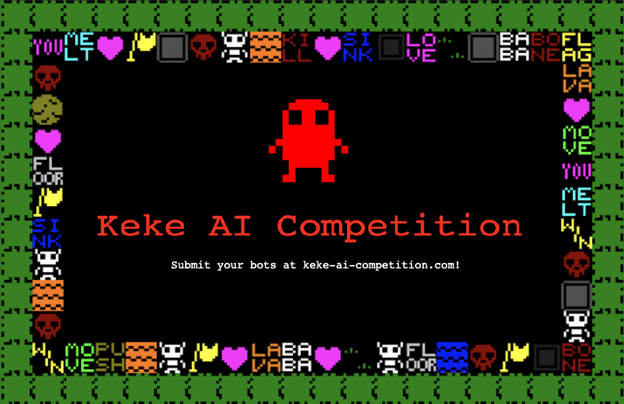
Organisers names and affiliations M Charity (NYU)Sarah Chen (Independent)Mike Green (NYU)Julian Togelius (NYU) Website link https://keke-ai-competition.com/ (Tips:If you want to open the web link, you must turn https into http.) Video Contact Email: kekeaicompetition@gmail.com Twitter: @Keke_is_AI Submission deadline May 7th - warmup round August 14th - final round Other information Keywords: Puzzle games, sokoban, baba is you, level solver Programming languages: Javascript Complexity: Medium Competitive: New Competition Barrier of entry: Medium 
|
|
Video Game Championship AI Competition 2022 Work on strategic games that require team composition is currently unexplored in AI. The VGC AI Competition aims to emulate the competitive scenario of human video game championships with AI agents. Battle agents must master both Pokémon battling and Pokémon team building, with only information about past team choices aggregated and compiled in a meta-game information. The competition is organized in three competitive tracks, the Battle Track, the VGC Track and the Meta-Game Balance Track. In the Battle Track, battle agents must be able to pilot any given team. The winner is determined by the outcome of sequential battles organized as a tree championship. The Championship Track focuses on the team building aspect in the presence of an ever-evolving meta-game. Battle agents must be able to adapt as quickly as possible to the meta-game by choosing the best teams to compete against the teams they believe they will be facing. The winner is determined by its final ranking after many epochs of simulation. Finally, in the Meta-Game Balance Track a designer agent will have to do maintenance of a complete Pokémon roster. His performance will be evaluated by accumulated points over temporal checkpoints in function to the diversity of the meta-game. 
Organisers names and affiliations Simão Reis, Luís Paulo Reis (LIACC/Faculty of Engineering of University of Porto) Nuno Lau (IEETA/University of Aveiro) Website link https://gitlab.com/DracoStriker/pokemon-vgc-engine/-/wikis/Edition/VGC-AI-Competition-2022-Edition Video Tracks (1)Battle Track: This track focused on Pokémon battling where agents must be able to pilot any team against any challenging team. (2)Championship Track: This track focuses on Pokémon team building in the presence of a continuous battle ecosystem with public meta-data information. Contact Email: Simão Reissimao.reis@outlook.pt Discord:https://discord.gg/GwKHqXpdjf Submission deadline 30th June 2022 Other information Keywords: Learning, Search, Strategy Adversarial Games, Team Building, Game Design Programming languages: Python Complexity: High Competitive: New Competition Barrier of entry: Low 
|
Football AI Competition Football (a.k.a. soccer) is one of the most popular sports in the world. Teaching AI to play football is quite challenging because agents need to learn complex concepts such as passing and defensing. Training football agents requires a balance of short-term control and high-level strategies, including how to overcome opponent's defense in order to score goals. The Football Environment, a reinforcement learning environment, provides challenging and interesting opportunities to train AI playing football in an advanced, physical-based 3D simulator. This environment implements a complete football game and includes the most common football concepts, for example goals, fouls, corners, penalty kicks, yellow cards, red cards and offsides. The competition has open registration on Feb 23rd, 2022 and will close on Aug 9th, 2022. 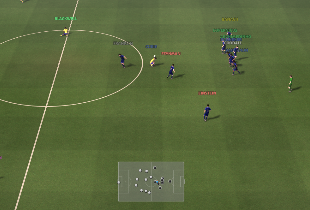
Organisers names and affiliations Haifeng Zhang (Institute of Automation, Chinese Academy of Science (CASIA)) Website link https://www.jidiai.cn/cog_2022/ (Tips:If you want to open the web link, you must turn https into http.) Video https://video.cas.cn/masvod/public/2022/03/04/20-220304_17f53832ebd_r29_800k.mp4 Tracks (1)5vs5 Track: both left and right team control 4 players in each team except the goal keeper of the corresponding team. (2)11vs11 Track: both sides control the full set of players (11 players) in each team. Contact Haifeng Zhang: haifeng.zhang@ia.ac.cn Yahui Cui: yahui.cui@ia.ac.cn Submission deadline Open Registration: 2022.2.23 Warm-up 1st Round (Submission Deadline 2022.6.28 10:30) Warm-up 2st Round (Submission Deadline 2022.7.12 10:30) Final 1st Round (Submission Deadline 2022.7.26 10:30) Final 2st Round (Submission Deadline 2022.8.9 10:30) Other information Keywords: learning, 3D-simulation Programming languages: Python Complexity: High Competitive: Very High (>100) Barrier of entry: Medium 
|
|
3D Open World FPS AI Competition Focusing on open-world FPS game AI, this year we are hosting a new competition called 3D Open World FPS AI Challenge. Featuring a battle royale-style 3D open environment and random PCG-based world generation, this new game will challenge AI agents to some of the most important skills in FPS games, such as navigation, scouting, and skirmishing. To win the competition, agents need to have a strong perception of complex 3D environments, then learn to exploit various environmental structures (such as terrain, buildings, and plants) and develop highly flexible strategies to gain an advantage over competitors. Although the problem is difficult, we hope that this new competition will become a cornerstone of future AI research in open-world FPS games. AI in open-world FPS games has attracted increasing attention as the next grand challenge, following the success of AI in StarCraft and Dota. However, the lack of satisfactory testbeds remains an obstacle to research in this area. Under this circumstance, the goal of this competition is to boost research on intelligent agent learning for multi-player 3D open-world FPS games. In 3D open-world environments, an agent perceives its surroundings in a human-like manner, taking visual scenes as input. Intelligent agents are expected to integrate 3D perceptual and contextual data, process incomplete information, handle the dynamic environment and multiplayer enemies, and then perform long term planning. Plus, to maximize scores on the given tasks, agents also need to generalize to unseen test environments. In the competition, we provide an FPS game environment similar to popular battle royale games (e.g. PUBG), where multiple players compete against each other for limited supply resources. To make the competition more tractable, we have simplified the game task to only focus on collecting as many supplies as possible and break down the competition into 3 tracks, including navigation, supply gathering and supply battle (see our competition website for details). An agent's performance is evaluated based on the amount of supply it collects throughout the game, the more the better. We will evaluate each submitted agent across a number of randomly generated battlefields and use the average score as the metric for ranking and the final winner selection. For more detailed information, please visit our official website. Organisers names and affiliations Inspir.AI Website link: https://sites.google.com/view/inspirai-wildscav-cog2022/home Tracks (1) Navigation (Singleplayer): the agent is challenged to navigate from a source location to a destination location (both randomly sampled) as fast as possible in a randomly generated world. (2) Supply Gather (Singleplayer): the agent is challenged to collect as many supplies as possible within a given time in a randomly generated world with unknown distribution of supplies. (3) Supply Battle (Multiplayer): based on the setting of Track 2, multiple agents are dropped in a randomly generated (terrain, buildings, plants, supplies) large world to compete for supplies. Agents are allowed to use weapons to fight and respawn after death with a short waiting time. Contacts E-mail:cog2022@inspirai.com Submission deadline August 14th Other information Keywords: Open World, FPS, Reinforcement Learning Programming languages: Python Complexity: High Competitive: Medium (>30) Barrier of entry: Medium 
|
Geometry Friends Cooperative Game AI Competition The goal of the competition is to build AI agents for a 2 player collaborative physics-based puzzle platformer game (Geometry Friends). The agents each control a different character (circle or rectangle) with distinct characteristics. Their goal is to collaborate in order to collect all diamonds in a set of levels as fast as possible. The competition challenges AI to cooperate at different levels including task planning and action coordination. 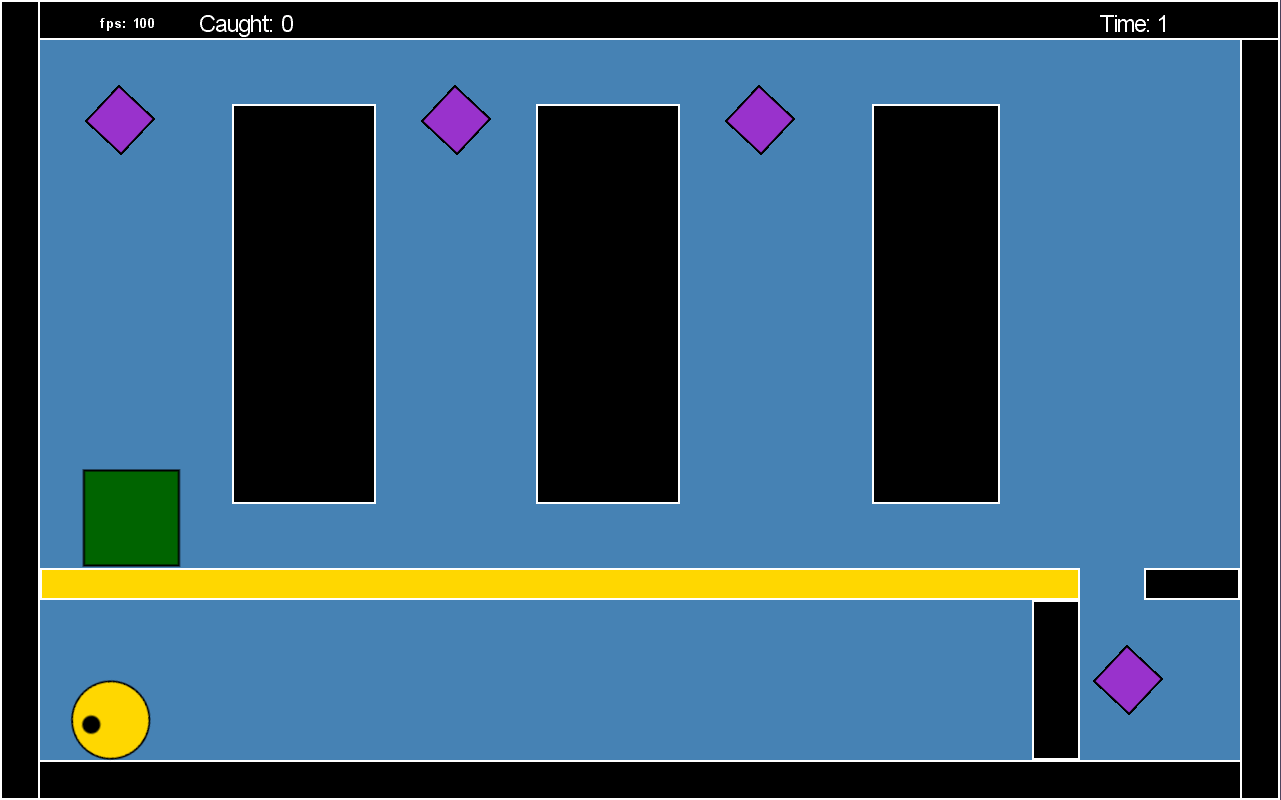
Organisers names and affiliations Rui Prada, Francisco S. Melo, Inês Lobo, Inês Batina (INESC-ID and Instituto Superior Técnico, Universdade de Lisboa) Website link https://gaips.inesc-id.pt/geometryfriends/ Video https://www.youtube.com/watch?v=ogcV8pZT5nw&t=6s Tracks (1)Cooperation Track: Develop two cooperative agents, addressing the full challenge. (2)Circle Track: Develop one agent for the role of the Circle, addressing single-player levels more focused on movement control. (3)Rectangle Track: Develop one agent for the role of the Rectangle, addressing single-player levels more focused on planning motion. Contact Email:gfcompetition@gaips.inesc-id.pt Email:rui.prada@tecnico.ulisboa.pt Submission deadline 19 August 2022 Other information Keywords: 2-player, cooperation, 2D-platformer, puzzle, coordination, planning, physics-based Programming languages: C# Complexity: Medium (tracks #2 and #3), High (track #1) Competitive: Low (<10) Barrier of entry: Low 
|
|
Strategy Card Game AI Competition The game is a small implementation of a Strategy Card Game, designed to perform AI research. Its advantage over the real cardgame AI engines is that it is much simpler to handle by the agents, and thus allows testing more sophisticated algorithms and quickly implementing theoretical ideas. Its goal is to encourage advanced research, free of drawbacks of working with the full-fledged game. It means i.a., embedding deckbuilding into the game itself (limiting the usage of premade decks), and allowing efficient search beyond the one turn depth. All cards effects are deterministic, thus nondeterminism is introduced only by the ordering of cards and an unknown opponent's deck. The game board consists of two lines (similar to TES:Legends), favoring deeper strategic thinking. Because of the domain's properties, Strategy Card Games are a very suitable subject for evolutionary-based approaches. First, as in other multi-action games, rolling horizon evolution is considered, alongside MCTS, one of the best-performing search algorithms. Second, as the game contains many parameters used in repeatable context (card statistics and keywords), there are multiple opportunities to treat parts of the game as an optimization problem (board evaluation, arena draft evaluation), which can be successfully tackled by evolution. The current edition introduces "Constructed Mode," where an agent will be presented with a set of randomly generated cards before each game, and it has to create its deck using these cards. Thus, the deckbuilding is dynamic and cannot be simply reduced to using human-created top-meta decks, but is less random and gives more control for the agent than the Arena Mode. The new version of the game also introduces cards with Area of Effect, which was the most important feature standard in other card games but so far missing in our game. 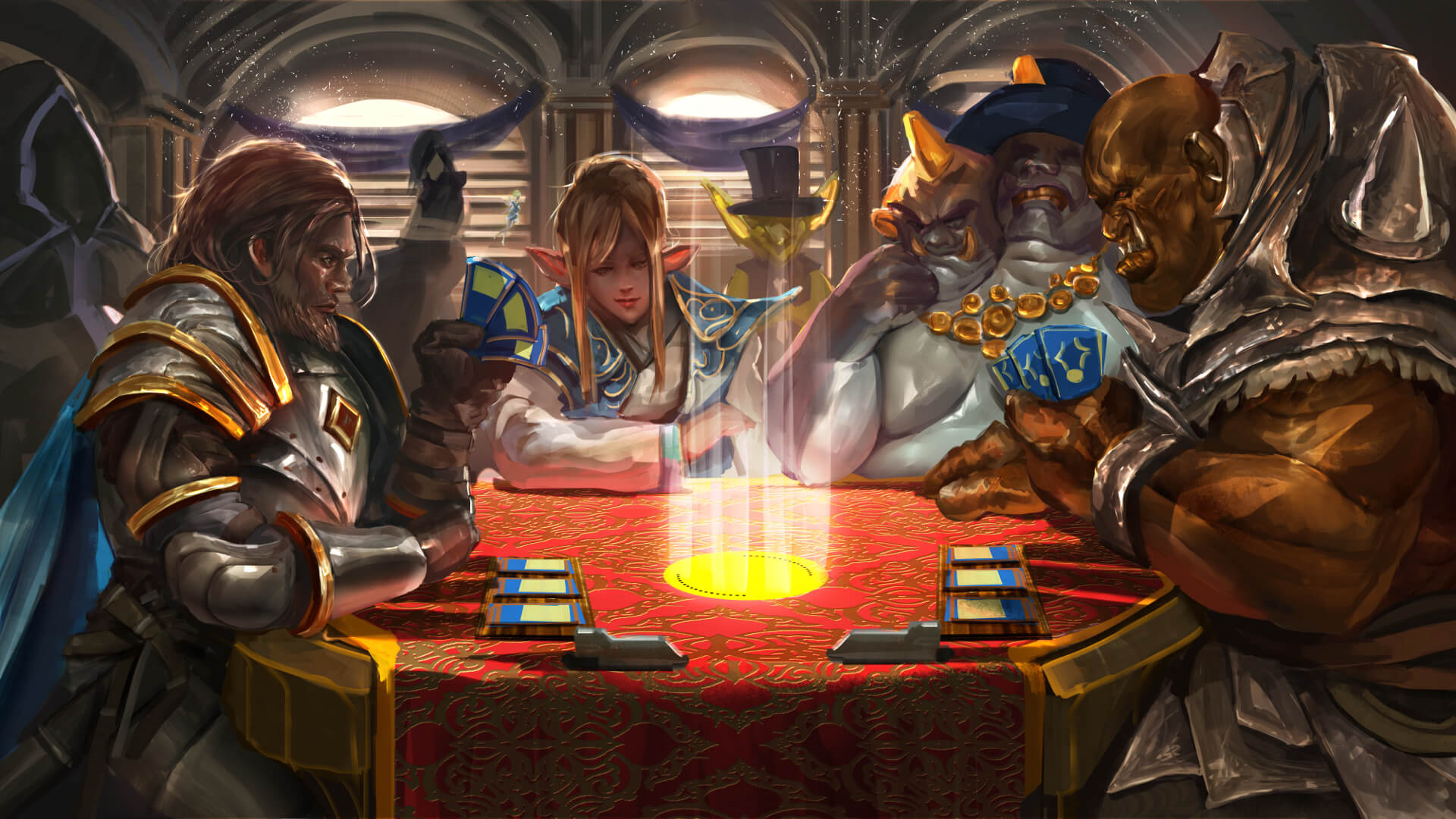
Organisers names and affiliations Jakub Kowalski, Radosław Miernik (University of Wrocław) Website link https://legendsofcodeandmagic.com/COG22/ Contact Email: jakub.kowalski@cs.uni.wroc.pl Email: radoslaw.miernik@cs.uni.wroc.pl CodinGame Discord: https://discord.gg/qAKXEEv Submission deadline 1st August 2022 Other information Keywords: card games, imperfect information, randomness, zero-sum games, multiaction games, search, planning, opponent prediction Programming languages: Any Complexity: Medium Competitive: Low (<10) Barrier of entry: Low |
StarCraft AI Competition IEEE CoG StarCraft competitions have seen quite some progress in the development and evolution of new StarCraft bots. For the evolution of the bots, participants used various approaches for making AI bots and it has fertilized game AI and methods such as HMM, Bayesian model, CBR, Potential fields, and reinforcement learning. However, it is still quite challenging to develop AI for the game because it should handle a number of units and buildings while considering resource management and high-level tactics. The purpose of this competition is developing RTS game AI and solving challenging issues on RTS game AI such as uncertainty, real-time process, managing units. Participants are submitting the bots using BWAPI to play 1 vs. 1 StarCraft match. Organisers names and affiliations Cheong-mok Bae, Jaeyoung Moon, Issac Han and KyungJoong Kim Website link https://cilab.gist.ac.kr/sc_competition Video https://www.youtube.com/watch?v=7CBfIVZG6os Contact Email: starcraft.aic@gmail.com Submission deadline 10th July 2022 Other information Keywords: StarCraft, Real-time Strategy games, RTS games, strategy games, planning, decision-making Programming languages: C++, Java Complexity: High Competitive: Low (>10) Barrier of entry: Low  
|
|
RoboMaster Sim2Real Challenge The competition includes the factors of adventure and confrontation contained in classic video games. The agent needs to complete a specific task and shoot against the built-in agent to complete the final task. The robot needs to find 5 targets whose positions are randomly generated in the maze, and complete the activation in a specified order. In 3 minutes, the agent which finds 5 targets and activates them at the fastest and safe speed wins. The competition will be divided into two stages: in the first stage, the agent only needs to complete the above tasks in the simulation environment. We will select the agents with higher scores to participate in the second stage. In the second stage, we deploy the participating agents to the physical robot and test them in a real environment. At this stage, the agent needs to deal with the difference between the simulated robot actuator and the physical actuator, and the state difference caused by a different environment. The agent can adjust the model according to the feedback data and results. 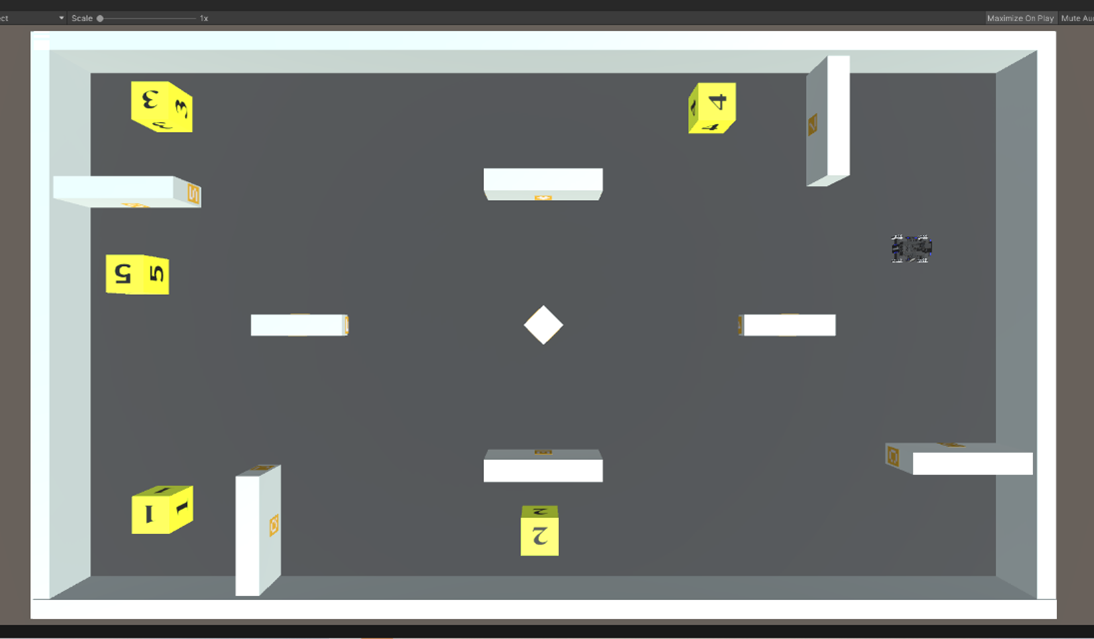
Organisers names and affiliations Haoran Li, Yaran Chen, Boyu Li, Shasha Liu, Dongbinz Zhao (Institute of Automation, Chinese Academy of Sciences) Bopei Zheng (College of Robotics, Beijing Union University) Qianli Ma (SZ DJI Technology Co., Ltd) Website link 1. https://sites.google.com/view/2022cogsim2real 2. https://eval.ai/web/challenges/challenge-page/1513/overview Tracks (1)Complete information-based track: The state of the robot includes its position in the map, speed, image at the current time, and the target position (but it does not know the corresponding order, which can be determined only after detecting the visual label). The algorithm is required to output the speed command to control the robot. (2)Image-based track: The robot can obtain only the image and speed of the current time. The algorithm is required to output the speed command to control the robot. Submission deadline 15th March: Registration 15th June: First stage deadline 15th August: Second stage deadline Other information Keywords: Robomaster EP ; Sim2Real; Adventure and confrontation ; navigation; path planning; Reinforcement learning. Programming languages: Python Complexity: High Competitive: New Competition Barrier of entry: High 
|
No Go Competition No Go is short for No Capture Go, it has also been called Anti Atari Go. While the rules are similar to that for the ancient Chinese game of Go, the strategy and tactics are completely different. No Go is a young game. The first mention that is on Anti-Atari Go by John Moore in April 2005. No Go is a variant of go that is basically the opposite of Atari Go. One advantage of No Go is that each valid No Go game is also a valid Go game. In January 2011, this game was selected as the featured game for the 2011 Combinatorial Game Workshop at Banff International Research Station (BIRS) , A series of computer games tournaments sponsored by the Taiwanese Association for Artificial Intelligence (TAAI) in 2011 included a No Go competition.In August 2012, the National Computer Games Championship held by the Chinese Association for Artificial Intelligence(CAAI) included a No Go competition, the No Go competition has been held for ten years. No Go Competition with AI is interesting and challenging. Join us and submit your algorithms! 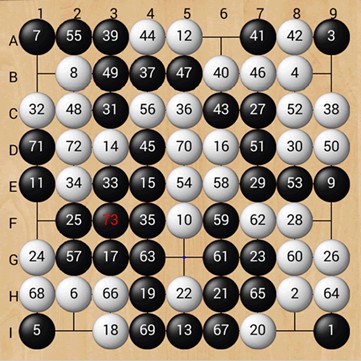
Organisers names and affiliations Xuhui Zhao (BOHAI University, China) Website link https://computergames.caai.cn/download.html (Tips:If you want to open the web link, you must turn https into http.) Submission deadline May 31st, 2022 Other information Keywords: Machine learning, search, board games Programming languages: Any Complexity: Medium Competitive: Medium (>20) Barrier of entry: High |
|
Mahjong AI Competition Mahjong is a game for four players that originated in China. It is a popular Chinese game played with sets of tiles in China now. Mahjong belongs to card entertainment, made of bamboo, bone or plastic rectangular pieces, engraved with patterns or words. The rules of the game are slightly different in different regions in China. The basic game has 108 tiles, including 36 characters, 36 bamboos, and 36 circles, which are the suits. These are, in turn, divided into four sets of numbers 1 to 9 in each suit. There are also 16 wind tiles and 12 dragon tiles. Many sets also include eight bonus tiles with four flowers and four seasons, but these are not necessary in the basic game. Playing Mahjong involves skill, strategy, and calculation. It can be said that mahjong is actually a combination of cards and dominoes. Compared with other forms of dominoes, mahjong is the most complex and interesting game play, its basic playing method is simple, easy to get started, but there are many changes, collocation combination varies from person to person, so it has become one of the most attractive game in the history of China. In April 2017, the International Mind Sports Association announced that Mahjong was officially a world mind sport. Playing Mahjong with computer is interesting and challenging. Join us and submit your algorithms! Organisers names and affiliations Tongyuan Huang (Chongqing University of Technology Hongjun Li (Chengdu University of Technology) Website link https://mj.jj.cn/3032/official/#/home Contact Tongyuan Huang: tyroneh@cqut.edu.cn Hongjun Li:18572481@qq.com Submission deadline May 31st, 2022 Other information Keywords: planning, puzzle games Programming languages: Any Complexity: Medium Competitive: High (>75) Barrier of entry: High |
Fight the Landlord AI Competition “Fight the landlord” is one of the most popular card games played in China, with rich cultural and historical background. 3 players attempt to remove their own cards as fast as possible, after a bid competition for the landlord title. The game features asymmetric player roles and poker-like hands. Can AI be the best landlord or fight them? Playing Fight the landlord involves skill, strategy, and calculation. Playing Fight the landlord with computer is interesting and challenging. Join us and submit your algorithms! 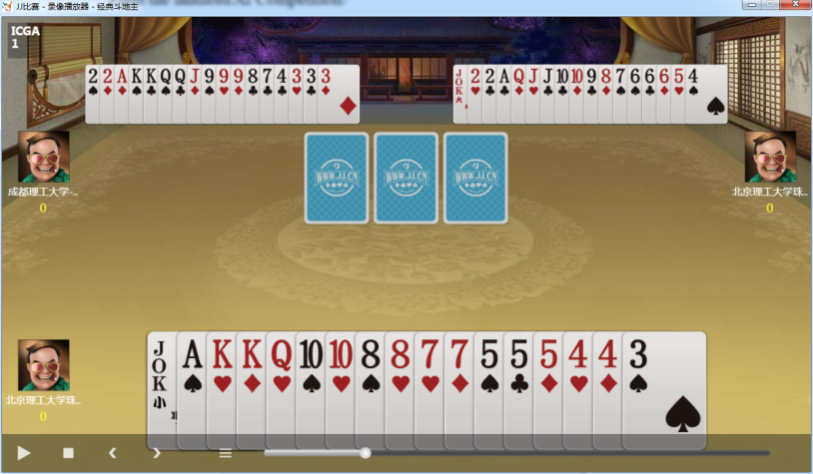
Organisers names and affiliations Yu Wu (Chongqing Three Gorges University) Website link https://computergames.caai.cn/ (Tips:If you want to open the web link, you must turn https into http.) Contact Email:458891735@qq.com Submission deadline May 31st, 2022 Other information Keywords: planning, puzzle games Programming languages: Any Complexity: Medium Competitive: Very High (>100) Barrier of entry: Medium |
